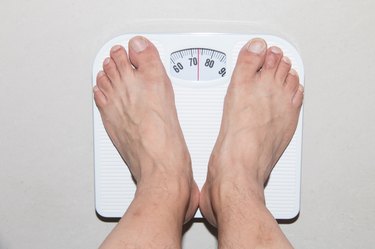
Weight gain is a common side effect of antidepressants, which is why physicians often also prescribe an appetite suppressant. Scientists do not know completely how antidepressants increase eating, but the source of the problem is that patients continually crave and binge on carbohydrates, according to Judith Wurtman, Ph.D., founder of Harvard University Weight Loss Center. Consult your doctor about taking antidepressants and appetite suppressants.
Serotonin Explained
Video of the Day
Serotonin regulates mood and appetite. It is a neurotransmitter, a substance in the brain that communicates messages between nerve cells. Many antidepressants, such as selective serotonin reuptake inhibitors, tricyclic antidepressants and monoamine oxidase inhibitors, sustain brains levels of serotonin by inhibiting the breakdown of serotonin and thus enhancing mood. However, scientists observe that antidepressants may interfere with serotonin's ability to regulate appetite.
Video of the Day
Antidepressants
Antidepressants treat depression, a mood disorder characterized by persistent sadness, feelings of worthlessness, a loss of pleasurable interests and insomnia. Depression affects approximately 10 percent of adults each year and twice as many women as men. Selective serotonin reuptake inhibitors, also called SSRIs, are the newest class of antidepressants. Research by scientists at the University of Texas Medical Branch in Galveston and published in the "Journal of Clinical Psychiatry" in 2003 reports that SSRIs are associated with weight gain that emerges and persists after one month of treatment.
Appetite Suppressants
Appetite suppressants are medications that either reduce your appetite or enhance the feeling of fullness. There are a few FDA-approved prescription appetite suppressants that physicians can prescribe today for weight loss, and these appetite suppressants can be prescribed for up to 12 weeks -- their effectiveness wanes thereafter. These medications have side effects that include increased blood pressure and heart rate, sleeplessness, nervousness, dizziness and headache.
Considerations
The brain neurochemistry involved with depression and appetite is each very complex. There are no drugs that have been FDA approved to prevent weight gain from antidepressants. If you have depression and take antidepressants for treatment, you should never use weight-loss products without first consulting your physician. Nonetheless, there are ways to reduce your risk of weight gain. Increasing your physical activity and reducing your calorie consumption from foods, particularly by avoiding unhealthy fats, such as saturated fats from meat and dairy and trans fats from processed foods. Dr. Wurtman recommends that the way to turn off appetite is by increasing serotonin production. You can do this by eating carbohydrates on an empty stomach without additional protein or fat, particularly in the evening. Research published in the November 2007 issue of the "Journal of Psychiatry and Neuroscience" notes that milk and chickpeas may help increase serotonin production.
- Psychology Today: Ten Tips to Prevent Weight Gain on Antidepressants
- Helpguide.org: Types of Antidepressants and Their Side Effects
- Journal of Clinical Psychiatry: Long-Term Side Effects of Ssris: Sexual Dysfunction and Weight Gain
- National Institute of Diabetes and Digestive and Kidney Diseases; Prescription Medications for the Treatment of Obesity
- MedlinePlus: Sibutramine
- Journal of Psychiatry and Neuroscience: How to Increase Serotonin in the Human Brain Without Drugs